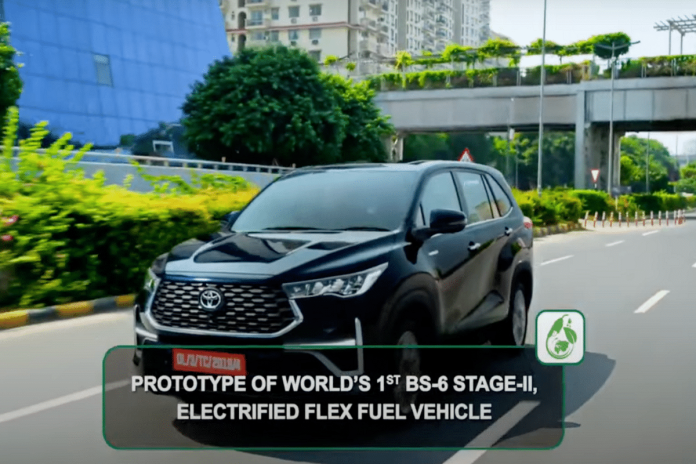India’s stride into the electric flex-fuel frontier doesn’t just mark a technological milestone; it signifies the nation’s dedication to a cleaner, more sustainable tomorrow.
India has taken a monumental step towards sustainable transportation with the launch of the world’s first BS-VI (Stage-II) electric flex-fuel vehicle running exclusively on 100 per cent ethanol.
Flex fuel technology is a technique that allows an engine to run on petrol that contains more than 20 per cent ethanol.
Union Minister Nitin Gadkari unveiled this innovative solution today (29 August), emphasising India’s commitment to reducing carbon emissions and breaking away from traditional fossil fuels.
The new Toyota Innova Hycross will run on 100 per cent ethanol and would be an important step in the move towards alternative fuels and reduce air pollution.
Here are the key takeaways from this groundbreaking development:
1. A Greener Future Unveiled: Union Minister Nitin Gadkari introduced an electrifying addition to the Indian automotive landscape at the Mint Sustainability Summit 2023. The revolutionary vehicle, an ethanol-fueled variant of the popular Toyota Innova, stands as a testament to India’s dedication to sustainable transportation solutions.
The vehicles were unveiled ahead of India’s objective of increasing ethanol blending in petrol to 20 per cent by 2025-26, as per Times Of India report.
2. Ethanol-Electric Synergy: This innovative vehicle marries the advantages of ethanol and electricity, offering a glimpse into a cleaner, more efficient future.
By utilising 100 per cent ethanol and generating up to 40 per cent of its electricity, the flex-fuel Toyota Innova presents a compelling case for embracing alternative energy sources.
3. Redefining Energy Independence: Gadkari’s vision extends beyond eco-friendliness – it encompasses economic autonomy.
With India’s staggering Rs 16 lakh crore oil import bill in mind, Gadkari stressed the importance of reducing dependence on foreign oil. By pivoting towards ethanol and electricity, India can significantly curb this financial drain and bolster its economy.
4. Pollution Solutions: Transport sector accounts for 40 per cent of air pollution. The need to develop greener fuels is beyond economics. Gadkari’s drive for sustainability aims to combat India’s pressing pollution woes.
The new ethanol-powered Innova represents a crucial step towards reducing air and water pollution, preserving the environment, and fostering a healthier ecosystem for future generations.
5. Track Record of Innovation: This isn’t the first time Gadkari has championed eco-friendly transportation solutions. In the previous year, he unveiled the Toyota Mirai EV – a hydrogen-powered car designed to pave the way for a green hydrogen-based ecosystem.
The pilot project aimed to raise awareness about green hydrogen and Fuel Cell Electric Vehicle (FCEV) technology’s potential.
India’s stride into the electric flex-fuel frontier doesn’t just mark a technological milestone; it signifies the nation’s dedication to a cleaner, more sustainable tomorrow.
As the world collectively steers towards greener pastures, India’s pioneering efforts could set an inspiring example for other countries striving to balance innovation, economic progress, and environmental preservation.


